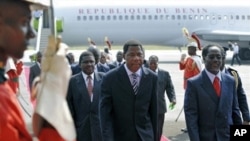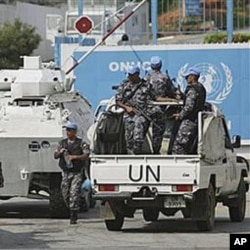A U.S.-based Ivorian-born university professor told VOA Ivory Coast President Laurent Gbagbo has forgotten a 2005 agreement when he argues the international community is interfering in the country’s internal affairs.
N’Dri Assie-Lumumba, professor at the African Studies and Research Center at Cornell University, said Mr. Gbagbo agreed that the United Nations would certify the results of last month’s disputed election.
“It was in 2005, in Pretoria, that it was decided that the United Nations would have a very specific role to play in the process of election. Five years later, the elections have taken place and the United Nations had been playing the role that the outgoing president himself had agreed upon. Therefore, the argument that the external powers, with Western states as leaders, are trying to destabilize Cote d’Ivoire to take away its autonomy are irrelevant,” she said.
Assie-Lumumba said she would be one of those who would resist any external interference because she said African countries should continue to work hard to remain relevant as contemporary modern states with the power to deal with their own affairs.
But, she said Mr. Gbagbo is using external interference as a pretext to continue to cling to power.
Three West African presidents met with Mr. Gbagbo Tuesday in Abidjan to demand that he accept the results of last month's elections and step down or face possible removal by West African military forces.
Assie-Lumumba said Mr. Gbagbo should heed the advice of the sub-region and step down, but she said, given Mr. Gbagbo’s nature, she doubts he will step down voluntarily.
“He should listen, but I doubt he would listen. He’s not that type of person. Also, at this point, his mental state is involved in another sphere, literally thinking of himself as the one who will carry the flag of autonomy or of independence of Africa, evoking all kinds of arguments that have no relevance whatsoever in the situation that has been presented to us – that an election had taken place and there had been a clear winner and that he (Gbagbo) has decided to ignore the voice of the people,” Assie-Lumumba said.
She said the cancellation of a Wednesday rally in Abidjan by the youth wing that supports Mr. Gbagbo could be a sign that those around Mr. Gbagbo may be trying to soften their position.
“There are also many people around him who have an interest in seeing him stay in power. At the same time, at this point, some of them are trying to look at the big picture and to see their own interest. The sanctions will not affect Mr. Gbagbo alone. Many of the people who are supporting him will be affected by the sanctions,” Assie-Lumumba said.
She said, even though it seems the only language that Mr. Gbagbo understands is the use of force, West African leaders should not have threatened force. Instead, Assie-Lumumba said, sanctions are more powerful than violence.





